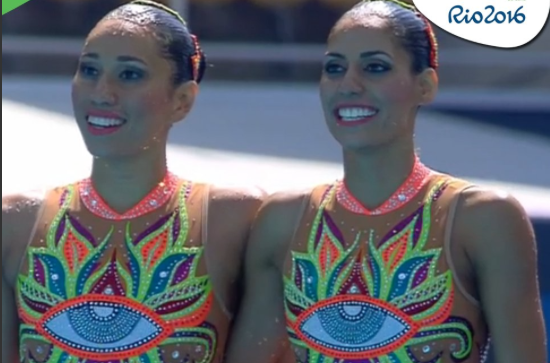 Bollywood, especially Pritam Chakraborty, was in for a pleasant surprise when the Mexican synchronised swimmers Karem Achach and Nuria Diosdado chose Pritam’s hit track ‘Aila Re Aila’ to perform their pair routine at the Rio Olympics.
Bollywood, especially Pritam Chakraborty, was in for a pleasant surprise when the Mexican synchronised swimmers Karem Achach and Nuria Diosdado chose Pritam’s hit track ‘Aila Re Aila’ to perform their pair routine at the Rio Olympics.
The impressive 2.20-minute routine choreographed to the fast-paced song from the Akshay Kumar-starrer Khatta Meetha (2010) sung by Daler Mehndi was greeted with applause at the event. Even more importantly, the rountine was so successful they made it into the finals!
Insiders reveal that Pritam was amazed to know that his music has been making a wider impact internationally than he had even imagined. What he was more thrilled about was that the Mexican duo performed the number on 15th August, our Independence Day.
Pritam said, “A friend just shared that the Mexican Swim team performed a routine on Aila re Aila! Brought back so many memories…”
Akshay Kumar also gave a shoutout to the swimmers on Twitter, “Superb stuff. Congratulations to them for qualifying for the finals.”
The hit music-maker of films like Bajrangi Bhaijaan and Dilwale is currently working on the music of Kabir Khan’s Salman Khan starrer Tubelight, and Anurag Basu’s Jagga Jasoos.
This isn’t the first time when Bollywood made its presence felt at an international sporting event.
In 2010, American figure skaters and defending champion, Charlie White and Meryl Davis, returned to the US Figure Skating championship with a medley of Bollywood songs that opened with Kajrare from Bunty Aur Babli, and Silsila and Dola Re from Devdas. In 2007, Maureen Ibanez and Neil Brown of France chose Bole Chudiyan from Kabhie Khushi Kabhi Gham for their Junior World Championship in Bulgaria. More recently, Russians Tatiana Volosozhar and Maxim Trankov performed on Dhol Baje from Goliyon Ki Raasleela: Ram Leela at the European Figure Skating Championships in Slovak Republic.











